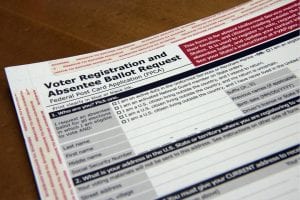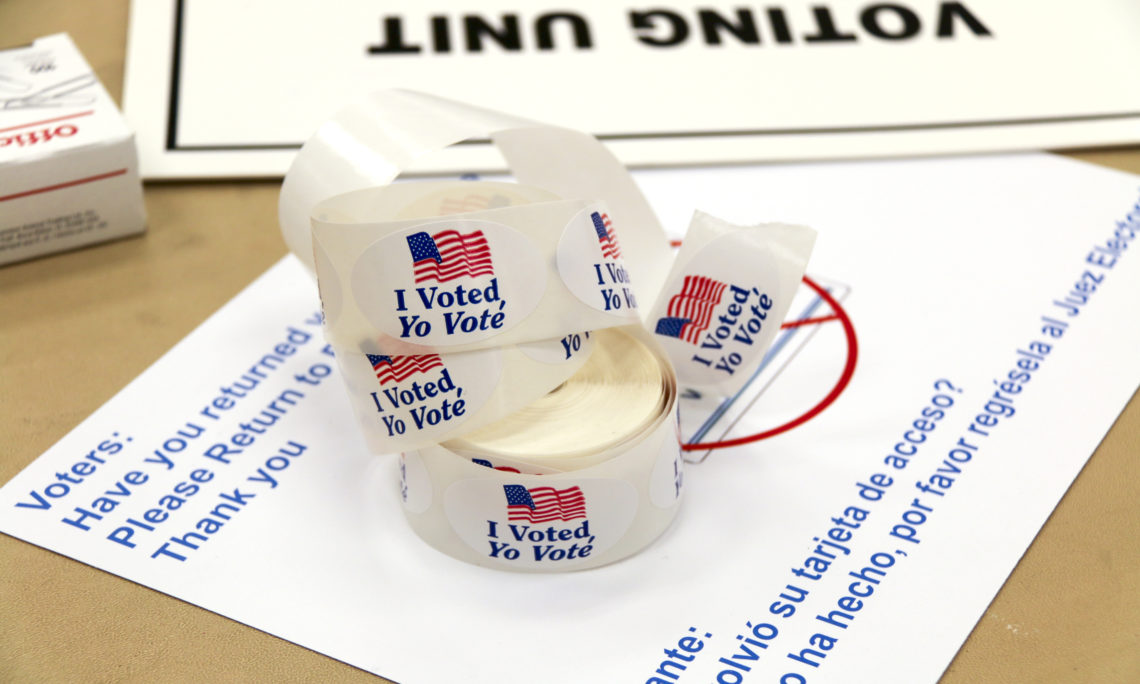New York to create statewide accessible absentee ballot program.
New York, NY (April 5, 2022): The National Federation of the Blind of New York State, American Council of the Blind of New York, Inc., Center for Independence of the Disabled, New York, Disability Rights New York, and several New York voters with disabilities, including Rasheta Bunting, Karen Gourgey, Keith Gurgui, and Jose Hernandez, have settled the Americans with Disabilities Act (ADA) lawsuit they brought against the New York State Board of Elections (NYSBOE) in 2020. A federal court has approved and ordered the terms of the settlement agreement, under which NYSBOE will create a statewide program allowing blind and disabled voters to fill out a remote, accessible vote-by-mail ballot online, print it out, and mail or return it to their county board of elections.
The settlement requires NYSBOE to choose a remote accessible vote-by-mail (RAVBM) system that allows blind people and people with print disabilities to use their own computers to read and mark a ballot, using their own screen-reader software that converts the ballot content into spoken words or into Braille displayed on a connected device. NYSBOE must also create a statewide portal that voters can use to request an accessible absentee ballot and train each of the fifty-eight county boards of elections on the use of the RAVBM system. The county boards of elections will provide return envelopes for the ballots, just as they do for paper absentee ballots. The inside oath envelope into which the ballot is to be placed must have a tactile marking indicating where it is to be signed, and NYSBOE will instruct county boards of elections to accept a signature anywhere on the envelope. County boards will also be required to help voters who do not have their own printers to facilitate the printing of their ballots. NYSBOE will also pay attorney’s fees and costs of $400,000.

Plaintiffs were represented by Disability Rights New York, Disability Rights Advocates, and Brown Goldstein & Levy, LLP.
“DRNY is pleased that the absentee voting program is now more accessible. Through this agreement, the New York State Board of Elections has made it easier for people with print disabilities to vote with greater privacy and independence. All voters need access to vote in order to have their voice heard in their local, state and federal elections,” said Timothy A. Clune, Executive Director, Disability Rights New York.
“The National Federation of the Blind supports the right of blind, deafblind, and other disabled voters to mark their ballots privately and independently so that their right to a secret ballot is protected,” said Mike Robinson, President of the National Federation of the Blind of New York State. “We are pleased that the state of New York is taking these steps so that its blind and deafblind voters can exercise this constitutional right, which is fundamental to participation in our democracy.”
“This ruling affirms that the right to vote is something that all people regardless of disability status should be able to fully exercise as their civil duty. It will provide absentee voters access via an electronic platform for people with a myriad of disabilities, including but not limited to, visual, learning, and physical,” said Sharon McLennon-Wier, Ph.D., MSEd., CRC, LMHC, Executive Director of the Center for Independence of the Disabled, New York. “This is a great step forward in making sure that New Yorkers with disabilities are able to successfully cast their votes.”
Karen Blachowicz, President of the American Council of the Blind, New York said, “we’re pleased that the state will provide consistent accessible absentee voting methods and supervision of every county board, so that every blind voter in New York can be confident of an accessible absentee vote.”
“We will continue to fight for the fundamental right of people with disabilities to vote privately and independently,” said Christina Brandt-Young, Supervising Attorney at Disability Rights Advocates.
About American Council of the Blind (ACB): The American Council of the Blind is a national grassroots consumer organization representing Americans who are blind and visually impaired. With 70 affiliates, ACB strives to increase the independence, security, equality of opportunity, and to improve quality of life for all blind and visually impaired people. Learn more by visiting www.acb.org.
About Center for Independence of the Disabled, NY (CIDNY): The Center for Independence of the Disabled, NY’s goal is to ensure full integration, independence, and equal opportunity for all people with disabilities by removing barriers to the social, economic, cultural, and civic life of the community. Learn more about our work at www.cidny.org.
About Disability Rights Advocates (DRA): Disability Rights Advocates is a leading national nonprofit disability rights legal center. Its mission is to advance equal rights and opportunity for people with all types of disabilities nationwide. DRA has a long history of enforcing the rights of voters with disabilities, including their rights to accessible voting machines, polling places, and online voter registration. Visit www.dralegal.org.
About Disability Rights New York (DRNY): DRNY is the designated independent non-profit Protection & Advocacy System empowered by Congress to investigate allegations of abuse and neglect and provide legal and non-legal advocacy services to people with disabilities in New York State. The Protection & Advocacy System was created by Congress as a direct result of the horrific conditions that were uncovered in the 1970’s at New York’s Willowbrook State School. DRNY is supported at tax payer expense by the U.S. Department of Health & Human Services, The Administration for Community Living; Center for Mental Health Services, Substance Abuse & Mental Health Services Administration; U.S. Department of Education, Rehabilitation Services Administration; and, the Social Security Administration. This press release does not represent the views, positions or policies of, or the endorsements by, any of these federal agencies. Visit www.drny.org.
About National Federation of the Blind (NFB): The National Federation of the Blind, headquartered in Baltimore, defends the rights of blind people of all ages and provides information and support to families with blind children, older Americans who are losing vision, and more. Founded in 1940, the NFB is the transformative membership and advocacy organization of blind Americans with affiliates, chapters, and divisions in the fifty states, Washington DC, and Puerto Rico. We believe in the hopes and dreams of blind people and work together to transform them into reality. Learn more about our many programs and initiatives. Learn more about our many programs and initiatives at www.nfb.org.


Join the conversation!